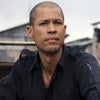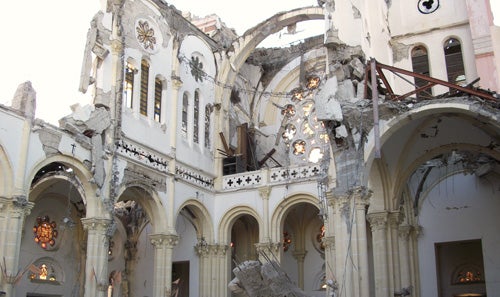There and Back Again
Journalist Vladimir Duthiers’ career has come full circle
 Vladimir Duthiers ’91 has heard the saying, “The key to immortality is living a life worth remembering.” It was these words, in part—oft-quoted, and variously attributed to Bruce Lee, Jesus, and St. Augustine—that led him out of a successful career in finance and back to his true passion.
Vladimir Duthiers ’91 has heard the saying, “The key to immortality is living a life worth remembering.” It was these words, in part—oft-quoted, and variously attributed to Bruce Lee, Jesus, and St. Augustine—that led him out of a successful career in finance and back to his true passion.
In September of 1987, Duthiers, the son of Haitian immigrants living in New York, came to URI as a journalism major. He quickly became involved in media, writing for The Good Five-Cent Cigar and hosting a program on the campus radio station. A keen interest in his history and political science classes eventually led him to change his major. He continued to take journalism classes, as well as military science courses as part of ROTC, but in the end, he graduated with a political science degree.
After URI, it wasn’t long before the scarcity of jobs in the writing world led Duthiers to Wall Street. He would spend the next sixteen years working at AllianceBernstein, a $400 billion global asset management firm. He made his way to the helm of their Investment Professional Institute, traveling all over the world to deliver the firm’s investment research and host client engagement seminars. During his time there, Duthiers was part of an international unit that helped generate billions of dollars in assets for the firm.
Although in many ways he was living the life he had imagined for himself, traveling frequently and seeing the world, Duthiers realized that his job wasn’t really in the “immortal” category. “I started to think a lot about my time as a college student, when I wrote for the URI newspaper,” he remembers. “I had always been passionate about news.” He had grown up in a family that discussed politics, history, and philosophy at the dinner table. And he remembered the feeling he got from truly influential pieces of media. When he was at URI, he watched the civil rights documentary Eyes on the Prize in an American history class. “I remember thinking, that’s what I want to do,” he says. “I want to find interesting stories, put things into perspective, and provide context so people can understand this world we live in.”
Before long, Duthiers was in graduate school at Columbia University, studying broadcast journalism. Eager to get hands-on experience, he searched for an internship and wound up working as a production assistant for fellow URI graduate Christiane Amanpour ’83. CNN’s chief international correspondent. After earning his master’s degree from Columbia, Duthiers continued to work for Amanpour.

Meanwhile, on a Columbia journalism class field trip to CNN, Duthiers had also met Anderson Cooper, another well-known face. Duthiers mentioned to Cooper that he was fluent in Haitian Creole. About a month later, the 7.0 earthquake rocked Haiti in January 2010. “I got a call in the middle of the night from Anderson’s executive producer,” remembers Duthiers. He was asked to accompany Cooper to Haiti as an interpreter.
“When I got to the airport,” he remembers, “I was blown away, because there were all the CNN correspondents I’d grown up watching.” He was in for an even bigger shock when they touched down in Haiti, the immense devastation at a level Duthiers had never seen before. “In Port-Au-Prince, there were just stacks and stacks of bodies piled up,” he says. “I struggled with being there to do a job as a journalist and also balancing the emotional toll. I had a common history with these people.”
Anderson Cooper and his team, including Duthiers, stayed in Haiti for four weeks and ultimately won two Emmy awards for coverage of the quake. Due to his fluency in Creole, Duthiers played a larger role in the rescue efforts than that of an ordinary journalist. He remembers clearly how a mother named Manoushka approached rescue workers, saying that she could hear the voice of her 10-year-old daughter in the rubble of a daycare center. Duthiers was asked to call out to the child, asking her to tap three times so that workers could identify her position. Although he and another worker felt they heard a response, after hours of searching, the workers concluded that no one was alive at the site anymore. “We had to tell her that her daughter had died,” says Duthiers.
Running over the incident in his mind, Duthiers thought he had probably imagined the child’s response, coming weakly up from the deep rubble. But when the news team played back the footage they shot that day, a faint voice was audible in response to Duthiers’ prompting. “So there really was someone in there,” he says.

This emotional time in Haiti marked the true beginning of Duthiers’ journalism career. He would go on to work as a full-time production assistant for the CNN Anderson Cooper 360˚ show, returning to Haiti to report on a corrupt American missionary who was abusing young boys, among other stories.
As a journalist, Duthiers finds himself still drawing on the lessons he learned while an undergraduate at URI. His military training through ROTC has helped him in multiple ways, both practically in how he packs his backpack when heading out to the field, and theoretically in the material he draws from when commenting on situations of conflict. His political science and history classes also still inform his work. “A lot of the professors that I was exposed to at URI helped shape my worldview,” says Duthiers. “I learned a lot about the way countries work, how governments operate and interact with each other, how the things you see on the surface are not necessarily what is going on behind the scenes. That taught me to be very critical of the power structures, which has helped me immensely as a journalist. And in this work, if you don’t have a good understanding of the background of a country and its significant events, you are not fully embracing your responsibility as a reporter.”
Currently, Duthiers is a CNN correspondent in Nigeria. He calls it one of the most challenging places in the world to report on, but also one of the most amazing. “It’s a country of 160 million people, the second largest economy in Africa, yet it has a third-world infrastructure, and most people survive on two dollars a day. There is a lot of religious violence, conflict around the oil industry, and the politicians are a whole different breed altogether.” Although there were other assignments Duthiers could have taken, he chose Nigeria for the reward of being a witness to things that might otherwise be overlooked.
Whether pressing Haiti’s president to crack down on child traffickers or investigating reports of Nigeria’s military supposedly shooting suspected terrorists, Duthiers is up for the challenge. “On any given day, it could be anything,” he says of his work in Nigeria. “Last week, I did a story on 25 college students who were hauled out of their dorm in the middle of the night and systematically killed by unknown people. In America, that story would be huge. It would dominate the press! Here it’s news but not on most people’s radar.”
It is this work of bearing witness that has Duthiers finally doing something that feels worth remembering. The transition from security to living his passion has not disappointed. “I feel blessed and fortunate to be a correspondent at CNN. This is a news organization I grew up watching. There are days I need to pinch myself! And it’s a huge responsibility to report the news and give voice to the voiceless. I never lose sight of that.”
—Bethany Vaccaro ’06
 Home
Home Browse
Browse Close
Close Events
Events Maps
Maps Email
Email Brightspace
Brightspace eCampus
eCampus


